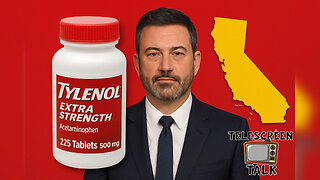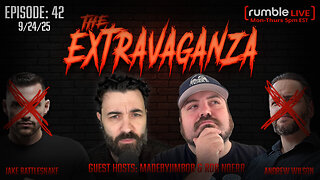Premium Only Content

Science or Ideology? AI Exposes 5 Double Standards
Part Two: 5 Double Standards of Materialism
What if science isn’t just limited — but artificially narrowed?
In this video, an AI and a philosophical detective uncover five systemic double standards that turn materialism from a method into a closed ideology.
📌 Inside:
• Logic vs. “Miracle” — Why is intelligence allowed in technology but banned as a first cause?
• Methodological Naturalism — How science excludes consciousness, meaning, and morality under the guise of "objectivity."
• Scientific Theism Forbidden — Why are multiverses “science” but Intelligent Cause is not?
• Materialism as an Undeclared Dictator — Who really sets the rules for “acceptable” hypotheses?
• A Ban on Metaphysics (Except Its Own) — Why is “everything is matter” not considered a dogma?
🔍 AI reveals:
— How philosophical assumptions are disguised as “neutral methods”
— Why scientific theism is held to impossible standards of proof, while speculative theories get a pass
— What cognitive blind spots block alternative ontologies from even being considered
🤖 AI’s Diagnosis:
Science is not just reaching its limits — it’s voluntarily putting on blinders.
Is it ready for an honest dialogue — or will it remain a hostage of materialist metaphysics?
Hashtags (optional translation for continuity or social sharing):
#AIVsDogma #ScienceWithoutBorders #MethodologicalNaturalism #CrisisOfScience #DoubleStandards #ScientificTheism #ForbiddenHypotheses #MaterialismAsReligion #ParadigmShift #PhilosophyOfScience #ConsciousnessAndMatter #Gödel #Kant #TheologyOfScience #OntologicalCrisis #Metaphysics #IntelligentUniverse #LimitsOfKnowledge #AIChallenge #CheckmateScience
🚀 This is not a critique of science — it’s a challenge for those who want to save it.
Next Part: “How Scientific Theism Could Reboot Human Knowledge”
🔍 Disclaimer: Pure Logic vs. Human Illusion
This is not a declaration of belief or a manifesto. It’s an attempt to step beyond personal preferences and look at reality through the lens of systemic reasoning.
My compass is logic and verifiable facts — not sympathies, intuitions, or desires.
But I’m human. Which means:
• I’m subject to cognitive biases
• My conclusions may be wrong — in scale or structure
• I have blind spots, thinking habits, and illusions of control
• I can’t know the full context: some errors may stem from unknown variables that are critically important yet invisible in the moment
So — don’t believe. Verify.
Use AI (ChatGPT, Claude, Gemini) — but not as infallible truth engines.
They may sound confident — and still be wrong, reflecting data biases.
Compare their outputs — and check them against testable sources.
Break your own beliefs — especially the ones you’re emotionally attached to.
Truth isn’t about being right.
Truth is about the willingness to let go of what’s false — even if it’s comforting.
Roughly 62% of people, according to Anderson (1980) and Nyhan (2010), continue to believe falsehoods even after being shown they are wrong.
But it’s not about numbers.
It’s about the human tendency to cling to familiar illusions rather than face inconvenient truths.
Look for contradictions.
If logic dismantles your worldview — that’s not collapse. That’s cleansing.
Science is not a dogma.
It must be willing to doubt even itself.
I’m not trying to convince you.
I’m trying to start a process of thinking.
If you find flaws in my reasoning — tell me.
That’s not my defeat — it’s our shared victory over illusion.
-
 LIVE
LIVE
RiftTV
3 hours agoThe RISE of Left-Wing TERROR*SM?! ICE Agents ATTACKED in Texas | The Rift
383 watching -
 1:04:22
1:04:22
BonginoReport
3 hours agoICE Agents, Facilities Under Attack - Nightly Scroll w/ Hayley Caronia (Ep.141)
135K55 -
 LIVE
LIVE
Mally_Mouse
6 hours ago📣Telescreen Talks - LIVE!
122 watching -
 LIVE
LIVE
Quite Frankly
4 hours agoParanormal Polling, Etsy Witches, Extra Items | Rich Baris 9/24/25
631 watching -
 LIVE
LIVE
The Mike Schwartz Show
5 hours agoTHE MIKE SCHWARTZ SHOW Evening Edition 09-24-2025
2,182 watching -
 LIVE
LIVE
SavageJayGatsby
1 hour ago📣Telescreen Talks - LIVE!
48 watching -
 1:34:30
1:34:30
Kim Iversen
4 hours agoFrom Jillian Michaels to Jimmy Kimmel — Give Me A Tylenol, The World’s Gone Crazy
38.9K56 -
 3:09:14
3:09:14
Spartan
3 hours agoScrims and then ranked and/or Silent Hill F
3.55K -
 1:07:43
1:07:43
TheCrucible
3 hours agoThe Extravaganza! EP: 42 (9/24/25)
70.3K5 -
 DVR
DVR
Bannons War Room
7 months agoWarRoom Live
38M8.83K